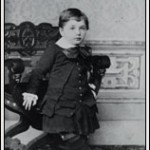 When Albert Einstein was four, his father gave him a simple magnetic compass for his birthday. Later on, in adulthood, Einstein wrote that this simple toy served to unlock his feelings of curiosity and wonder about the world He said that from that time on he was filled with a desire to ferret out the secrets of the universe.
When Albert Einstein was four, his father gave him a simple magnetic compass for his birthday. Later on, in adulthood, Einstein wrote that this simple toy served to unlock his feelings of curiosity and wonder about the world He said that from that time on he was filled with a desire to ferret out the secrets of the universe.
When Yehudi Menuhin was about the same age, his parents took him to hear the San Francisco Symphony Orchestra. After the violin performance, he told his parents that he wanted a violin for his birthday and that he wanted the man who performed on stage to be his teacher. Not wealthy, his parents nevertheless obtained a violin for him, and persuaded the man on stage to give him lessons.
When Martha Graham was sixteen, her father took her to see the dancer Ruth St. Denis at the Mason Opera House in Los Angeles. Thrilled by the performance, she decided to become a dancer and enrolled in an arts-oriented junior college. The rest, as they say, is history.
Each of these experiences is what has been termed by Howard Gardner and David Feldman as a “crystallizing experience.” These are experiences that can happen at any time of life, but often occur during the early years, when a seemingly simple experience–a toy, a concert, a conversation–unlocks a potential that has been just waiting around for something to start it rolling on its way towards high levels of achievement.
I like to call them “destiny experiences” because they represent a moment of time during human development when something seems to call from on high to remind an individual of their gifts and of what they are here on earth to accomplish. A wonderful book that explores certain aspects of this kind of experience is James Hillman’s The Soul’s Code: In Search of Character and Calling.
What were the destiny experiences in your life?
For more information about issues related to childhood, adolescence, and the human life cycle, see my book The Human Odyssey: Navigating the Twelve Stages of Life
This article was brought to you by Thomas Armstrong, Ph.D. and www.institute4learning.com.
Follow me on Twitter: @Dr_Armstrong



















